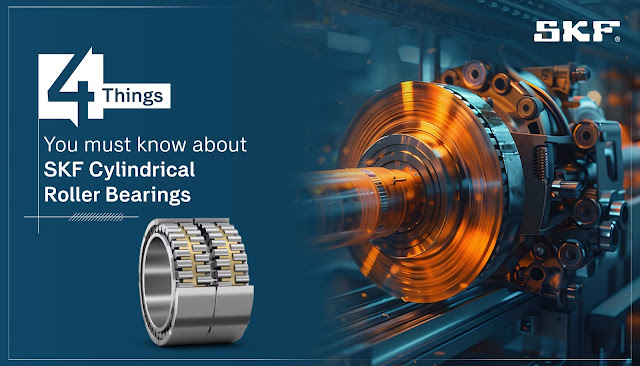4 Things You Must Know About SKF Cylindrical Roller Bearings
Does heavy-duty machinery not match the pace in keeping up with productivity and performance? Here, the cylindrical roller bearing pattern is superior.
The Cylindrical
roller bearings are designed primarily
to handle radial loads at high speed as they offer high load capacity. Simple
in structure and linear contact with the raceways, this bearing type has low
friction between the rollers and the ring, accelerating high-speed rotation in
heavy-duty machinery.
If you want to buy a cylindrical roller bearing that can carry multiple
radial loads rotating in heavy machinery types, cylindrical bearings are what
you need. Not just this, but cylindrical bearings also possess some factors you
should consider to optimize your results while reducing your cost and time.
Some of the
exclusive features or benefits of cylindrical bearings are:
- Excellent
load-carrying capacity
- High
stiffness, making the rotation go on and on
- Accommodate
axial displacement
- Lower
friction and higher axial carrying capability
- Reduces
sensitivity to misalignment and shaft deflection
- The roller surface and raceways
smartly support the formation of lubricant film, which promotes operational
efficiency.
The propelling features above make cylindrical
bearings a long-term, prominent choice for machinery. These result-oriented
features ensure long-term commitment to durability, performance, and outcome,
complementing the operations of machinery.
There are a lot more things and factors that you
must consider while selecting a cylindrical
roller bearing for your application. It will give you insightful
information on the structure, design, and materials of the bearings and the
range they are available in:
Material
Cylindrical bearings are usually made of
different materials based on various applications and uses. Alloy steel is one
of the most used and excellent-quality materials known for offering maximum
durability. Furthermore, these bearings are also manufactured using
material-pressed steel for higher performance, top-notch acceleration, and speed
with more carrying capacity.
Design
Cylindrical bearings are designed meticulously
and thoughtfully to ensure every ring and roller works efficiently and
operations remain at their standard level. The two rings in the design element
of the bearing are inner and outer rings separated by a set of cylinders. It
helps support the rings and reduce the frictional force. Depending on the variation
you use, the structure also has a cage attached. Different numbers of cylinders
are used in varying models, and this increase in number leads to an enhancement
in overall performance.
Application
Knowing the power-packed characteristics of cylindrical
bearings, it is clear that these bearings are widely used in heavy
machinery. The industries it covers are pulp and paper, etc. Beyond these
industries, their utilization is highly preferred during stressful conditions
because of their unbeatable performance and durability.
Models
Cylindrical bearings have different variations
and models featuring varying characteristics and purposes.
- Single-Row
Bearing
A single row is a model with one row of balls, a
single set of outer and inner rings, and a cage. It can easily accommodate
axial loads.
- Double-Row
Bearing
The double-row bearing type has two rows of
balls corresponding to one another. Like single-row bearings, it has two sets
of inner and outer layers and two cages. These are designed to support radial
loads and axial loads in both directions.
- Multi-Row
Bearing
The multi-row bearing model is a bearing with
two or more rows of balls or rolling elements. These are designed to carry combined,
heavy loads on machinery.
Final Thoughts
You will find a wide variety and variation of
cylindrical bearings, and SKF stands for its wide range of designs and series,
where every bearing is actual to its performance and quality. SKF’s cylindrical roller
bearings are manufactured with fine materials, sealed, and
protected from contaminants, water, and dust. These bearings ensure longer life
and upgrade operational efficiency by producing less friction and high
performance.




Comments
Post a Comment